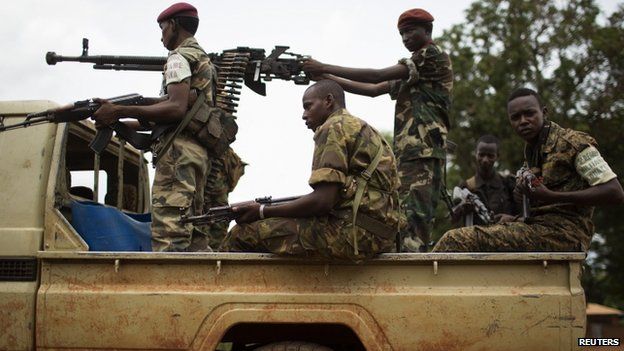CAR crisis: Meeting the rebel army chief
- Published
- comments

On a dirt side-street between the deserted petrol station and the hospital in Bambari in the Central African Republic, five well-armed soldiers were standing guard outside the tall gates of what must once have been a rather grand colonial villa.
A few minutes earlier, I had received a rather brusque phone call from a man called Major General Joseph Zoundeiko, who wanted me to come and see him immediately.
Gen Zoundeiko is the army chief of staff of what his headed notepaper describes as the "Forces Republicains" of the Central African Republic.
Maj Gen Joseph Zoundeiko wants CAR to split in two
To you and me, he is a rebel leader - part of the loose alliance of mostly Muslim forces known as Seleka which ousted CAR's president last year and held power until January.
Trying to understand the political power dynamics here is not easy.
The fact that the general represents men with guns - how many is unclear - gives him a certain status, but in conversations with government officials, diplomats and experts here, I have not been able to determine whether he is a minor pawn, an emerging threat, or a measured heavyweight.
Game of thrones
The only certainty about politics in CAR is the breathtakingly transparent cynicism of almost every single person involved.
This is a game of thrones in which the fate of one of the world's poorest nations is seldom even acknowledged.
Towns like Bambari, and its desperate population, are incidental factors in a narrow contest for power, and access to resources, in the only place that counts - the capital, Bangui.
The general's aide ushered me into the villa, clutching a yellow dossier with a statement that Mr Zoundeiko intended to read out to me.
It concerned the recent cease-fire announcement negotiated abroad - this is a country whose fate always seems to be determined elsewhere - and supposedly now in force across CAR.
Gen Zoundeiko mumbled his way a little hesitantly through the script - his French is a bit rusty, and the document clearly was not his work - but the overall message was clear.
The ceasefire would not be respected by the Seleka military, which had not been consulted properly or involved in the ceasefire negotiations.
So they were rejecting their political leaders' directive.
"We want peace. We don't want war. But we want sincere negotiations," he announced.
Then the general went further.
Whole communities have been displaced by the ongoing violence in CAR
For a long time the rebels have been muttering about the possibility of partitioning CAR along religious lines - dividing it into two independent countries as was done recently in neighbouring Sudan, with Muslims taking over the north-east, and Christians getting Bangui and the south-west.
It has never been clear the extent to which this is a serious suggestion, or merely a bargaining ploy. Or a bit of both.
It seems monumentally unpractical on many levels, and given the current mess in South Sudan, the international community is unlikely to back another break-up.
But tens of thousands of Muslims have been forced out of their homes, with many fleeing into Cameroon or Chad, and in Bambari most Muslims I spoke to felt partition was the right policy.
Bargaining chip
Gen Zoundeiko was adamant.
"This state - this nation - is finished," he told me.
The words hung in the air. I suggested it was a pity that Muslims and Christians could not be reconciled and share one country.
"Yes. But we've been chased away by our Christian brothers," he said.
"Today you'll find no Muslims in Christian neighbourhoods. But in Muslim neighbourhoods you'll still find Christians living under the protection of our soldiers."
I asked him where he proposed drawing a new international border - and whether Bambari, previously a predominantly Christian town, would become the capital of a new northern Muslim country.
"That's for the future to decide," he said abruptly.
Bambari - a 10-hour drive from the capital - is likely to be haggled over in any future peace talks
And with that, we left Bambari for the 10-hour drive back to the capital.
More militia checkpoints. Another puncture, and a few hours at a roadside tyre-repair stall.
It struck me that for CAR's political class, Bambari is simply a bargaining chip - a spot on the map to be haggled over, along with ministerial posts and salaries, at any future peace talks.
In contrast, I thought of Joseph Bama, the tireless doctor coping with a steady influx of wounded civilians at Bambari's dilapidated hospital.
I called him on the phone from Bangui.
"Three more cases yesterday, another casualty this morning.
"But I'm an optimist. You have to be," he said hurriedly before rushing back to the wards.
Read Andrew Harding's previous reports from his trip in CAR: